Protest to Policy
Case Studies and Program Recommendations

Social movements and protests are an integral part of democracy around the world. While some protests succeed in achieving policy change, others falter and subside without social change. In order to understand the factors that contribute to a successful protest movement, IRI analyzed protest movements from the recent past to determine which skills prepare democratic practitioners and activists to achieve their policy goals.
In particular, IRI examined five protests in Bangladesh, Ecuador, Georgia, Lebanon, and Nigeria between 2018-2022 that to certain degrees succeeded in extracting concessions from their respective governments. The following report, Protest to Policy: Case Studies and Program Recommendations distils common factors that contributed to success of democratic protest movements and identifies skills that help practitioners and activists in the field increase the likelihood of achieving democratic reforms.
The Case Study report builds on the Institute’s previous work studying social movements, including the Protest to Policy: A Framework for Supporting Democratic Transitions report, which is based on several decades of scholarly research to build an analytical framework outlining structural factors that affect protest movement success. Both the Framework report and Case Studies are intended to be used by implementing organizations and field-based champions of democracy to equip themselves and their peers with skills to effectively participate and contribute to reform-oriented protest movements.
The research in this report is part of a growing compendium of case studies to support social and civic movements achieve success and tangible change in the form of democratic reforms, and is part of IRI’s global governance-focused programming.
Top